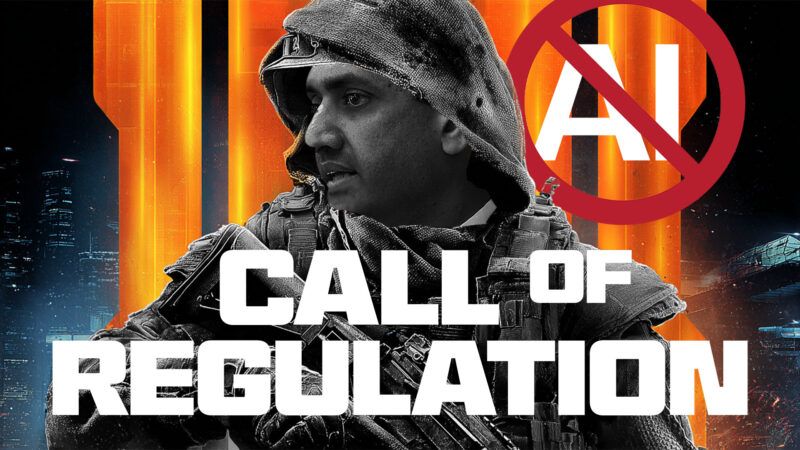AI Art in Call of Duty: Black Ops 7 Leads Rep. Ro Khanna To Call for More Regulation
The California congressman insists he's no Luddite, but his policy proposal suggests otherwise.

Rep. Ro Khanna (D–Calif.) called for regulation that would stop companies from replacing workers with AI on Friday, following denunciations of Call of Duty: Black Ops 7 for featuring AI-generated art. The constituency of video game designers may be niche, but Khanna's proposal is sweeping: a tax on mass displacement that would throttle technological adoption and slow economic growth.
Black Ops 7, the latest installment in the Call of Duty franchise, was released Friday. That day, video game journalists called attention to the game's apparent use of "AI-generated artwork across its core assets," including calling cards, posters, and reward icons.
But AI was not used to synthesize the game's most significant visual elements, including the landscapes, character models, vehicles, or weapon animations. And even those upset by the inclusion of any AI-generated art acknowledge that Activision, the game's developer, disclosed that its "team uses generative AI tools to help develop some in game assets."
Lewis White, FRVR editor in chief, lambasts the game's AI-generated calling cards as "images prompted by a bored intern who doesn't have a creative bone in their body." Product quality is certainly grounds for condemnation from consumers, but White also objects on the grounds that, "When [he pays] for a game, [he pays] for a service to the creatives making that game." It's a mistake, however, to view products as job programs—this only leads to higher costs and to people using spoons instead of shovels to move earth.
About 66 percent of creative professionals who use AI tools say they make better content with it, and 58 percent reported an increase in the quantity of content, according to an Adobe survey published in February 2024. In short, AI doesn't necessarily just substitute the work of creative professionals; it complements their work too.
Regardless of AI's benefits, Khanna insists "we need regulations [to] prevent companies from using AI to eliminate jobs [and] there should be a tax on mass displacement." AI is merely one of many tools that can replace certain jobs; if the government should prevent companies from eliminating jobs with AI, then it should prevent companies from doing so with any other technology. The predictable result of such invasive government management of businesses would be economic stagnation and shrinkage—leaving everyone worse off.
A tax on "mass displacement" is a tax on creative destruction, the process by which resource-, energy-, and labor-intensive modes of production are replaced with less costly ones that better satisfy consumer preferences. Khanna's requirement for "artists [to] have a say in how AI is deployed" would arbitrarily privilege the interests of a narrow group of producers over the rest of us.
Khanna insists that he is not for a "Luddite complete ban," but supports "guardrails for worker input before deployment" and tax reforms to discourage "excessive automation." What such generalities mean in practice is to substitute workers' interest to secure the largest share of revenue for themselves with business owners' interest to produce the best product at the lowest price. The latter is conducive to a growing economy that benefits everyone; the former is not.
